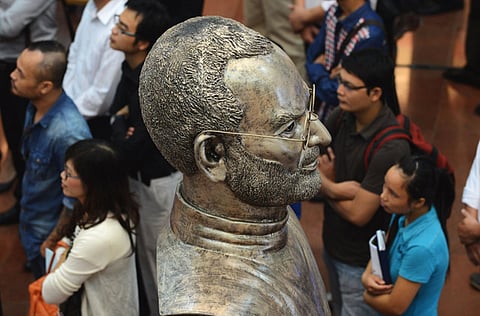Remembering Steve Jobs, a year on
Books on man who co-founded iconic tech firm Apple shed light on how his legacy has changed

San Francisco: Apple paid tribute Friday to Steve Jobs a year after his death, with a video and homage to the man who co-founded and propelled the iconic technology firm into the world’s biggest company.
“Steve’s passing one year ago was a sad and difficult time for all of us,” Jobs’s successor as chief executive, Tim Cook, said in a message on the company website.
“I hope that today everyone will reflect on his extraordinary life and the many ways he made the world a better place.”
Apple posted a two-minute video with snippets of Jobs and the various products he introduced, from the early Apple computers to the iPhone.
Jobs died October 5, 2011 at the age of 56 after a long battle with cancer.
When Jobs succumbed to cancer in his California home a year ago, the world rushed to eulogize him in glowing terms: Genius. Visionary. A modern-day Thomas Edison. Pundits marveled at his brilliance in creating a mystique about Apple products and knowing which unborn electronic gadgets consumers would most desire.
But in the 12 months since, as high-profile books have probed Jobs’ life and career, that reputation has evolved somewhat. As writers have documented Jobs’ often callous, controlling personality, a fuller portrait of the mercurial Apple CEO has emerged.
Nineteen days after Jobs’ death, Walter Isaacson’s much-awaited biography of the Apple leader hit stores and immediately became the top-selling book in the country. In “Steve Jobs,” Isaacson crafted a compelling narrative of how Jobs’ co-founded Apple with Steve Wozniak, got pushed out of the struggling company a decade later and then returned in the late 1990s to begin one of the most triumphant second acts in the annals of American business.
But he also spent many pages chronicling the arrogant, cruel behavior of a complicated figure who could inspire people one minute and demean them the next. According to the book, Jobs would often berate employees whose work he didn’t like. He was notoriously difficult to please and viewed people and products in black and white terms. They were either brilliant or “sh-t.”
As a young man Jobs abandoned his pregnant girlfriend and was later a cold, distant father to his daughter, Lisa. And in one especially callous episode, Jobs refused to give founding stock options to one of Apple’s earliest employees, even after a fellow employee intervened and offered to match whatever Jobs was willing to spare.
“What Isaacson’s book did was puncture a hole in the image the rest of the world had of Steve Jobs,” said Adam Lashinsky, a senior editor at Fortune and author of “Inside Apple: How America’s Most Admired -- and Secretive -- Company Really Works.” Thanks to Isaacson, “the population at large has gotten a much fuller picture of who he really was,” Adam Lashinsky, a senior editor at Fortune and author of “Inside Apple: How America’s Most Admired -- and Secretive -- Company Really Works.” said.
“Among Apple employees, I’d say his reputation hasn’t changed one bit. If anything, it’s probably grown because they’ve realized how central his contributions were,” Lashinsky added.
“History tends to forgive people’s foibles and recognize their accomplishments. When Jobs died, he was compared to Edison and Henry Ford and to Disney. I don’t know what his place will be in history 30, 40, 50 years from now. And one year is certainly not enough time (to judge).”



